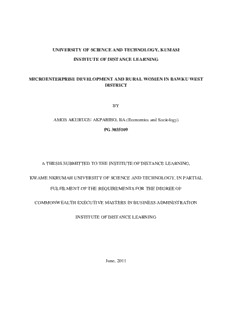
Amos thesis.pdf - Kwame Nkrumah University of Science and PDF
Preview Amos thesis.pdf - Kwame Nkrumah University of Science and
UNIVERSITY OF SCIENCE AND TECHNOLOGY, KUMASI INSTITUTE OF DISTANCE LEARNING MICROENTERPRISE DEVELOPMENT AND RURAL WOMEN IN BAWKU WEST DISTRICT BY AMOS AKURUGU AKPARIBO, BA (Economics and Sociology) PG 3035109 A THESIS SUBMITTED TO THE INSTITUTE OF DISTANCE LEARNING, KWAME NKRUMAH UNIVERSITY OF SCIENCE AND TECHNOLOGY, IN PARTIAL FULFILMENT OF THE REQUIREMENTS FOR THE DEGREE OF COMMONWEALTH EXECUTIVE MASTERS IN BUSINESS ADMINISTRATION INSTITUTE OF DISTANCE LEARNING June, 2011 MICROENTERPRISE DEVELOPMENT AND RURAL WOMEN IN BAWKU WEST DISTRICT BY AMOS AKURUGU AKPARIBO, BA (Economics and Sociology) A Thesis Submitted to the Institute of Distance Learning, Kwame Nkrumah University of Science and Technology In Partial Fulfilment of the Requirements for the Degree Of COMMONWEALTH EXECUTIVE MASTERS IN BUSINESS ADMINISTRATION Institute of Distance Learning June, 2011 i CANDIDATE’S DECLARATION I hereby declare that this submission is my own work towards the CEMBA degree and that ,to the best of my knowledge, it contains no material previously published by another person nor material which has been accepted for the award of any other degree of the University, except where due acknowledgement has been made in the text. ----------------------------------------- --------------------- AMOS, AKURUGU AKPARIBO, PG 3035109 Date Student Certified by: ------------------------------------------------ ----------------------- Dr. Theophilus Yigrilaa Nuodio Date Supervisor Certified by: ----------------------------------------- -------------------------- Dean, Institute Of Distance Learning, KNUST Date ii ABSTRACT Women own a large percentage of small scale enterprises worldwide and continue to play important roles in local development. Yet too little is being done for them and they remain disadvantaged when it comes to obtaining financial support for business start-ups and expansion. Micro-credit targeting of women-owned microenterprises will pull women out of current unacceptable high levels of poverty among poor women. A mixed methods descriptive research design, incorporating qualitative and quantitative data collection techniques was adopted for the study. Hundred and forty-three (143) respondents were selected from the five area councils via a stratified simple random sampling technique. Primary data were complemented by information gathered from BWDA Profile (2009) and other institutional reports. Each respondent reacted to a number of both negative and positively worded questions. Main micro entrepreneurial activities of BWD women are groundnut oil extraction, farming/dry season gardening, shea-butter oil extraction, malt production and pito brewing, dawadawa and rice processing, and weaving of smock materials. Funding for women-owned micro-enterprises included personal savings, loans from credit unions and Toende Rural Bank, NGOs/BWDA and family members. Lack of capital, collateralization of loans, high interest rates and delays in processing loans, lack of adequate markets for products and lack of adequate business management know-how were the main challenges to micro-enterprise development. Micro- enterprise development through micro-credit has positively impacted the lives of rural poor women entrepreneurs and their households, in terms of better and higher incomes, food security, ability to send and retain their children in school, generation of employment, greater access to health care and information on reproductive health issues, and economic and social empowerment to assert women rights, and to participate in discussions leading to household and community decision making. Financial and social intermediation schemes, insurance, training in business records keeping and financial numeracy, market-networking and life-long education for women can further promote microenterprise development and poverty reduction. iii ACKNOWLEDGEMENTS My thanks go to Dr. Theophilus Yigrilaa Nuodio, who supervised this thesis. I have appreciated his well intentioned criticisms and pieces of advice. I am equally grateful to the management and staff of Bawku West District Assembly for granting me permission to access some of their official documents and use of other facilities to gather useful background information for the study. Finally, I should like to thank my research assistants and all who contributed towards the successful completion of this thesis. iv DEDICATION I dedicate this thesis to my wife, Mrs. Georgina Ayamba, Akurugu, who was very supportive while I was undertaking the study. But for her financial support and prayers it would not have been possible for me to complete this herculean task. v TABLE OF CONTENTS PAGE Candidate’s declaration .................................................................….................i Supervisors’ declaration ....................................................................…............ii Abstract …………………………………………………………....................iii Acknowledgement .............................................................................…...........iv Dedication …....................................................................................................v Table of contents ……………………………………………………….........vi List of tables and figures …………………………………………................ix Appendices ……………………………………………………………..........56 CHAPTER ONE ………………………………………..................................1 INTRODUCTION...…………. ………………………...................................1 1.1.Background to the study ………………….........……………….................1 1.2.Statement of the research problem ……………………………..................4 1.3.Objectives of the study ……………………………………....……............5 1.4. Research questions…………………......……………………………........5 1.5.Significance of the study ……………………………......…………...........6 1.6.Limitations of the study …………………………......…………….............6 1.7.Organization of the chapters ………………………….......………….........7 vi CHAPTER TWO …………………………………………………….............8 LITERATURE REVIEW ...……….………………………………….............8 2.1. Introduction .............................................................................…...............8 2.2. Micro-enterprise development....................................................................9 2.3. Micro finance ...........................................................................................11 2.4. Concept of development............................................................................16 2.5. Poverty .....................................................................................................18 2.6. Conceptual framework chosen for the study.............................................24 CHAPTER THREE.......................................................................................29 METHODOLOGY.............................................................................…..........29 3.1. Introduction ………………………………..............................................29 3.2. Research design.........................................................................................29 3.3 Research site...............................................................................................30 3.4. Target population......................................................................…............31 3.5. Sample frame and size..................................................................….........31 3.6. Sampling design .......................................................................................31 3. 7. Sampling procedure…..............................................................................32 3.8. Types of data.............................................................................................33 3.9. Research Instrument: structure and content..............................................33 vii 3.10. Reliability and validity procedures……………………….………….....34 3.11. Data processing and analysis………………………………….…..........35 Summary..........................................................................................................35 CHAPTEER FOUR ……………………………………………………......36 DATA ANALYSIS AND DISCUSSION OF RESULTS...............................36 4.1. Introduction...............................................................................................36 4.2. Background of respondents…...................................................................36 4.2.1. Socio-economic and demographic profile of respondents..……….......37 4.2.2. Age distribution of respondents......................………………...............37 4.2.3. Marital status of respondents..................................................................39 4.2.4. Income and educational level of respondents.........................................39 4.2.5. Type of residential accommodation of respondents...............................41 4.3. The rural poor woman in Bawku West District........................................42 Summary...................................................................................................…...46 viii CHAPTER FIVE ……………….......………………………………………47 SUMMARY, CONCLUSIONS AND RECOMMENDATIONS……............47 5.1. Introduction ..............................................................................…............47 5.2. Summary of main findings of the study..................................…..............49 5.3. Conclusions………………………………………………………….......51 5.4. Recommendations....................................................................….............53
Description: